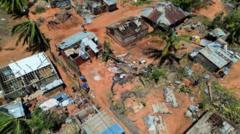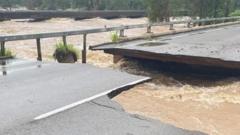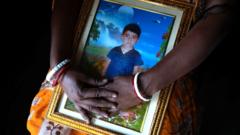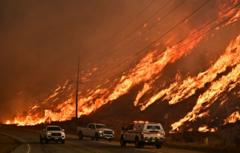In the wake of Cyclone Chido, which struck Mozambique last week with violent winds and heavy rainfall, the death toll has climbed to 94. The cyclone has wreaked havoc on the country's health and education systems, leaving hundreds of thousands affected.
Devastating Impact of Cyclone Chido Leaves Mozambique Reeling

Devastating Impact of Cyclone Chido Leaves Mozambique Reeling
Cyclone Chido has claimed 94 lives in Mozambique and affected over 622,000 people, with significant damage to education and health infrastructure.
Cyclone Chido has caused a tragic loss of life, claiming 94 victims in Mozambique since making landfall on December 15, according to local authorities. The National Institute of Risk and Disaster Management (INGD) has reported that 768 individuals sustained injuries, with more than 622,000 people impacted by this catastrophic event.
The cyclone struck with ferocious winds reaching 260 km/h (160 mph) and unleashed over 250mm of rain within the first 24 hours, initially hitting the French Indian Ocean territory of Mayotte before advancing to Mozambique, Malawi, and Zimbabwe. In Mozambique, the cyclone primarily affected the northern provinces, commencing its destructive path in Cabo Delgado and moving further inland to Niassa and Nampula.
The INGD revealed that the storm caused significant disruptions in the education and healthcare sectors, affecting over 109,793 students and inflicting severe damage on school infrastructure. Furthermore, 52 healthcare facilities were rendered inoperative, which poses a serious risk to health services in areas that already had limited access to care.
In response to this natural disaster, Daniel Chapo, leader of Mozambique's ruling party, indicated that the government is mobilizing resources at all levels to assist those impacted. During his visit to Cabo Delgado, one of the hardest-hit regions, he confirmed ongoing efforts, in collaboration with the INGD, to ensure recovery in the affected areas, including Mecúfi, Memba, Nampula, and Niassa.
In Mayotte, Chido is being recorded as the most devastating storm to hit the archipelago in nearly a century, with an official death toll of 35, though predictions suggest higher numbers could emerge as damage assessments continue. Over 1,300 emergency responders have been deployed to assist the local populace, and residents are still facing challenges with basic necessities. An ongoing air bridge is facilitating the delivery of much-needed supplies from Mayotte to mainland France.
The interior minister of Mayotte, Bruno Retailleau, confirmed that significant amounts of food and water are being distributed to meet urgent needs.
The cyclone underlines the vulnerability of social infrastructure under the pressures of climate change, highlighting the pressing necessity for better planning to mitigate such future events. The complex interaction between climate change and tropical storms remains a critical area of study, with the UN's climate body concluding that human activity is likely influencing both the intensity and precipitation associated with such weather events.






















